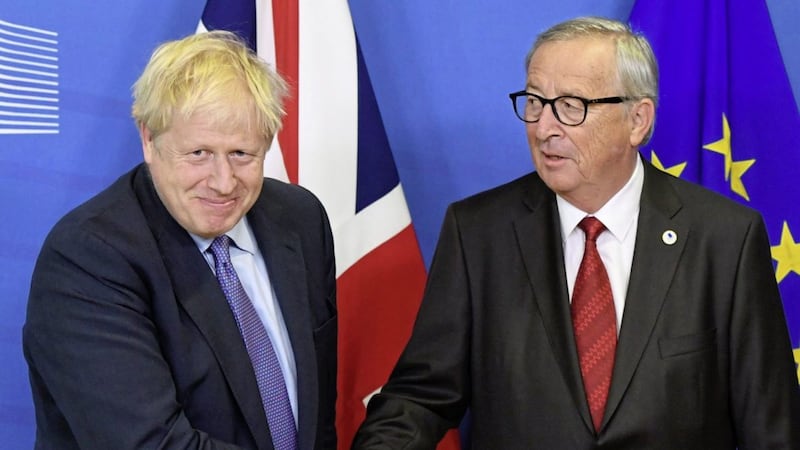LOYALTY to Britain is a one-way street. That's the political lesson which unionists might learn from Boris Johnson's Brexit deal, which proposes to place the north in an economically semi-detached relationship with Britain.
Despite centuries of unionist marching and drum-battering to proclaim allegiance to the monarch, the flag and the increasingly wispy concept of Britishness, Boris applied the well-known rule that there are no friends in Britain's colonial relationships, just temporary and expendable allies.
The DUP's subsequent refusal to support his deal suggests that the union between Great Britain and Northern Ireland is merely a political arrangement of mutual self-interest, in which each side is prepared to abandon the other for electoral success.
In economic terms, the deal represents a half-hearted attempt to give the north special economic status.
In a normal society the main political parties might have negotiated for free trade with both Britain and the south, as a foundation for a Singapore-style trading status, which could revolutionise our economy.
Instead we got political lethargy from unionism and political opportunism from nationalists, who now tell us that the Brexit which they opposed so strongly is really a stepping stone to a united Ireland.
So how did it all come to this and where do we go from here? Unionism is now past its sell-by date in London, because Johnson decided that the prospect of imminent Tory power at Westminster is more attractive than coaxing along those who live beneath what Churchill called the dreary steeples of Fermanagh and Tyrone.
He desperately wants to be prime minister in the mould of Palmerston, Disraeli and Churchill, bestriding the globe on behalf of Britain's post-imperial influence.
He aims to create an American-style economy at home, based on unregulated capitalism and he recognises that the north now has no strategic value to Britain's declining military might (Britain has 227 tanks. Russia has 20,000).
The DUP mistakenly waited to see what Theresa May and then Boris would negotiate with Brussels.
They should have been pro-active, listing the conditions to build a new economy in the north, rather than being bribed with a one-off payment. Instead they merely waited for the chance to shout "No surrender".
What happens now? If the DUP scuppers the deal in Westminster, Boris will have been defeated by Britain's historical policy in Ireland, ranging from the political and religious fundamentalism of the Ulster Plantation, to Irish partition.
Britain effectively created the values and attitudes of the DUP. What we are now witnessing is mere poetic justice.
Parliamentary defeat for Boris today is likely to lead to a British election, which may help the DUP to regain some of its lost ground.
Parliamentary victory may trigger an Irish general election, as Leo Varadkar tries to capitalise on his Brexit success.
It is a high-risk strategy, but leaving an election to the planned date of next May could be even riskier.
In the north, Stormont's introduction of a simple majority to determine support for the EU deal might usefully be extended into all its business - if it has a future.
Leo Varadkar said as much this week, when he belatedly called for the end of petitions of concern.
He might make that point to northern Sinn Féin when, as they said on Thursday, they would ask the Dublin government to explain the Brexit deal to them.
As for the EU, it tried to use the north as bait to keep Britain from leaving, but Boris cut the bait free and dumped the north.
That leaves Irish nationalism fervently supporting political union with 26 other countries.
These include Spain, which this week jailed nine peaceful, pro-independence leaders in Catalonia for up to 13 years.
It is odd political company for the Irish, who have yet to learn that not all the Boris Johnsons of this world live in Britain.
Looking at unionism's experience, nationalists might learn that loyalty to the EU is also a one-way street.
Like the unionists, they will learn that lesson the hard way.









